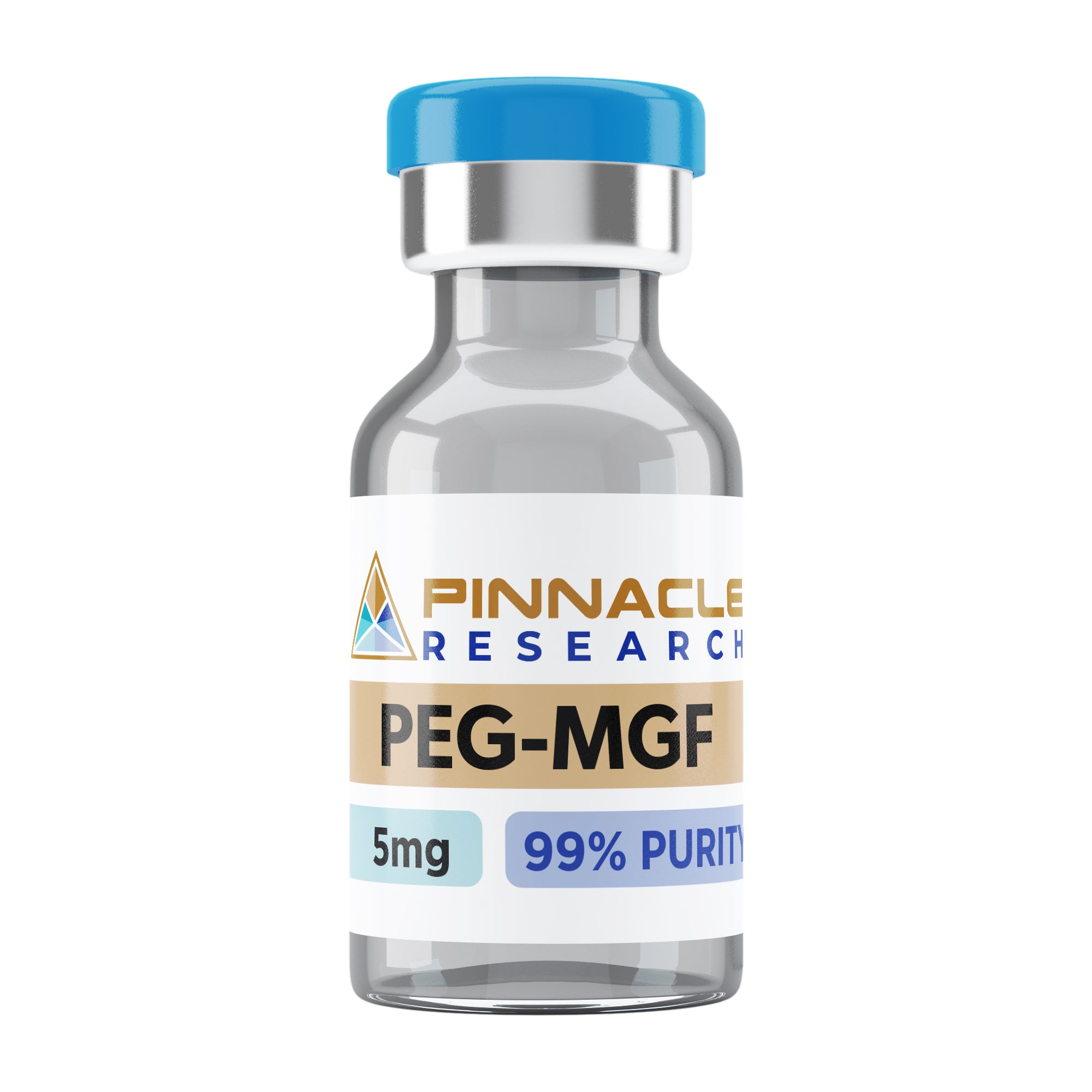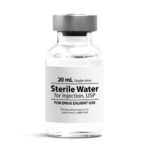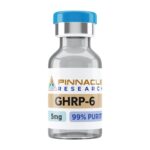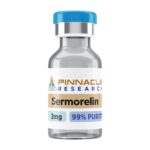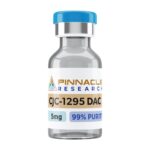About PEG-MGF
The PEGylated Mechano-Growth Factor peptide is an artificially modified version of IGF-1. Several studies have shown that the peptide decreases cholesterol and body fat. It also enhances the wound-healing process and boosts the immune system’s functionality. Read on and discover the health benefits associated with PEG-MGF.
What is the PEGylated Mechano-Growth Factor?
PEG-MGF (PEGylated Mechano-growth factor) is a slightly altered and truncated form of IGF-1 (insulin-like growth factor 1). The peptide triggers myoblast differentiation and (muscle cell) proliferation. Additional research studies have focused on the potentiality of the compound in lowering cholesterol, reduction of total body fat, increasing endurance, and boosting immune system functionality. There is also scientific evidence that suggests that the PEGylated Mechano-growth factor enhances functions related to wound healing.
PEG-MGF Chemical Structure
- Sequence: PEG-Suc-Tyr-Gln-Pro-Pro-Ser-Thr-Asn-Lys-Asn-Thr-Lys-Ser-Gln-Arg-Arg-Lys-Gly-Ser-Thr-Phe-Glu-Glu-Arg-Lys-Cys
- Molecular Formula: C121H200N42O39
- Synonyms: Pegylated MGF, PEG myotrophin, PEG IGF-1 Ec,
What is Pegylation?
The Pegylation process involves the attachment of polyethylene glycol to a chemical compound. The process is customarily facilitated to decrease the body’s immune reaction to a compound or an agent like the PEG-MGF. Thus increasing the compound’s half-life in the bloodstream through the clearance in the kidneys. The process is safe and has been confirmed to have plenty of health benefits. The PEGylated Mechano-growth factor was artificially curated because MGF had a short half-life. When MGF is administered exogenously, it has a much shorter half-life since it passes through the bloodstream first, unlike when injected directly into the muscle. PEG-MGF offsets this essential demerit associated with MGF.
PEG-MGF Research and Effects
Skeletal Muscle
Athletes suffer many injuries on the field during training or playing, ranging from avulsion injuries to strains and sprains. Most injuries will require surgical treatment and a more extended recovery period. Studies from research on mice show that PEG-MGF can be used to trigger a faster healing process. When the compound was directly injected into the affected muscle, it reduced oxidative stress and expression of specific inflammatory hormones. A similar study was done by Sun et al., confirming that MGF promotes the recruitment of neutrophils and macrophages to the injured site and modulates muscle inflammation. The two studies were based on the fact that exercise-induced muscle injuries stimulate the secretion of IGF-1Ea and IGF-1Eb.
Heart Muscle Repair
The bioengineering department of the University of Illinois performed research on the effects of MGF on cardiovascular health. Findings from the study showed that MGF prevented the programmed cell death of cardiac muscle cells, which is experienced after hypoxia. Researchers also observed that the peptide helped regenerate and heal after a heart attack by recruiting more cardiac stem cells to the injured part. The rats were administered MGF eight hours after suffering from hypoxia. They experienced greater stem cell recruitment and less cell death than the control group of rats.
Similar research revealed that the administration of MGF improved cardiac function after a heart attack by minimizing pathologic hypertrophy. The rodents given the peptide showed less cardiac remodeling and better hemodynamics. Additionally, when MGF is injected after an acute myocardial infarction, it can cause cardiomyocyte injury reduction by 35%.
Growth
Scientists did a research study on rabbits. It was observed that PEG-MGF increased bone repair rate by promoting the proliferation of osteoblasts. The osteoblasts are the body cells that can mineralize bone. The rabbits treated with higher doses of the MGF peptide experienced healing in four weeks, unlike the control group, which experienced healing in six weeks. Scientists believe that the technique can be used to promote bone healing and faster recovery.
Protecting Cartilage
Various research evidence confirms the effect of MGF in promoting the functionality of chondrocyte cells. The chondrocyte cells are primarily involved in cartilage health maintenance and deposition. According to a study on mice, MGF promoted chondrocyte migration from bone to cartilage. The findings show that PEG-MGF can be injected into the injured area and remain active for a long time. Theoretically, a single injection of the PEG-MGF peptide could remain active in the bloodstream for weeks and even months, unlike MGF, which would remain active for just a few hours.
Dental Applications
The PEG-MGF peptide boosts the expression of MMP-1 and MMP-2 and improves osteogenic differentiation. The observation was observed from a study on human periodontal ligament cell cultures. These factors observed in the study promote ligament repair, which attaches the tooth to the bone, providing an alternative dental treatment option for teeth extractions and implants. Patients can retain their natural teeth even after an injury. Scientists are even speculating that PEG-MGF can be used in saving avulsed and damaged teeth after they have been surgically re-implanted.
Neuroprotective Effects
Alexander Walker, Editorial Assistant at BioMed Central, reviewed a research study investigating the MGF effects on the central nervous system and the brain. The study looked at the long-term effects of increasing the levels of MGF in the bloodstream. The study’s findings suggest that increased MGF levels cause reduced age-related neuron degeneration effects. Therefore, the mice could maintain their cognitive functions and enjoy peak cognitive performance. Walker confirmed that the efficacy of the MGF compound in the brain was age-dependent.
A different study in mouse models of ALS has also revealed that MGF treatment improves muscle weakness and reduces motor-neurons loss. After a hypoxic injury, the brain naturally expresses MGF, which is overexpressed on the brain’s sections with the highest neuron regeneration. When exogenous MGF is administered, it can reduce the effects of neurological diseases. Even though the treatment doesn’t eliminate or address the root cause of the illness, it inhibits the death of neurons in the spine and brain.
Many research studies are still investigating the health benefits of the PEG-MGF peptide. PEG-MGF is a more potent peptide than MGF because it has a longer half-life, hence proving to have more effects and requiring a smaller dosage in treatment. When the compound was tested on rats under different studies, it was found to have several positive effects in promoting wound healing, lowering body fat and cholesterol, and boosting immune function. The compound exhibited low oral, excellent subcutaneous bioavailability, and moderate side effects in mice.
PEG-MGF is a viable treatment option for various illnesses which currently use MGF as part of their treatment therapy. Its longer half-life ensures it stays longer in the bloodstream hence more active.
